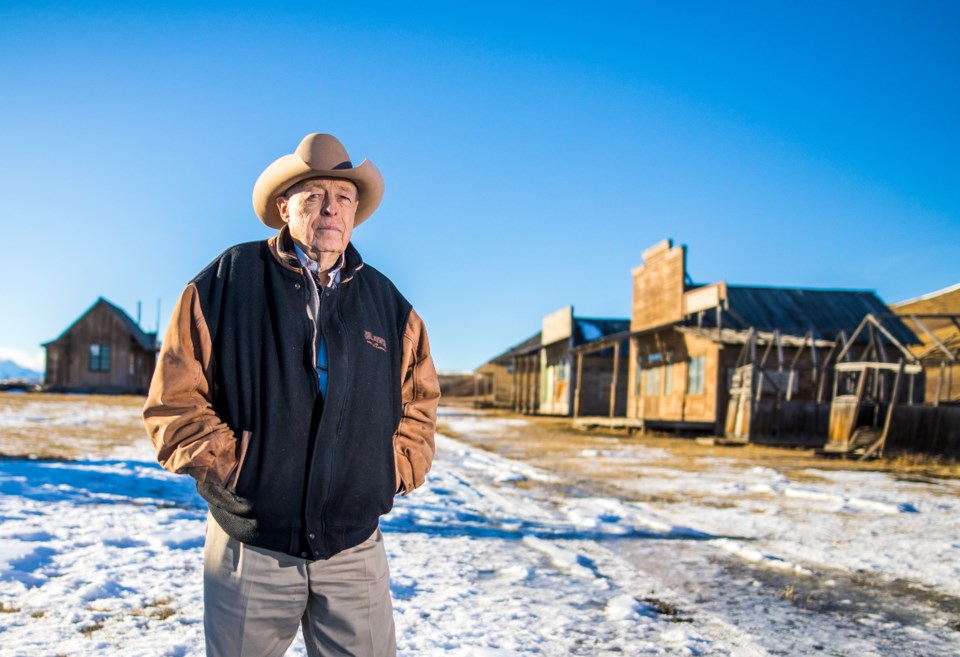Foothills residents in the filmmaking business hope to see a burgeoning industry following a provincial move that puts more money into television and film productions.
The Government of Alberta launched a Film and Television Tax Credit program that offers Alberta-owned productions a refundable tax credit to help cover production and labour costs up to $10 million per project.
John Scott, who operates John Scott Productions and has movie sets on his Longview area ranch, expects the announcement to mean more movies coming his way.
He’s currently working with the dark fantasy television series Wynonna Earp and expects three more productions on his ranch this summer including the television series Heartland and Black Summer.
“It’s definitely going to help us quite a bit,” he said. “We’re very grateful to get that. We’re on a level platform with the other provinces.”
Scott said several Albertans in the industry have been awaiting the announcement after the industry has suffered in Alberta for years, with film and television crews heading west to a more desirable British Columbia due to its tax credit program.
“Now that the announcement has been made it’s going to bring some business here,” Scott said. “Netflix and other major companies have expressed an interest. There’s nothing like a movie coming to town to employ people.
“If the business is here and people can work 30 to 40 weeks out of the year they will definitely be back.”
Among those spending time in B.C. is stunt performer and co-ordinator Guy Bews, of Longview. He said 90 per cent of his career is spent outside of Alberta. He spent all of 2016 and 2018 in Vancouver.
“As a performer you can’t make a living in Alberta and as a co-ordinator you can make a living, but it goes in waves, too. Not every movie has action in it.”
Locally, he’s worked on Fargo, Ghostbusters and Wynonna Earp.
“I’ve seen it go five months without one film in this town,” he said. “We need to keep that steady flow of three or four shows continuously year-round and grow bigger than that over time.”
Bews said the tax credit is good news for Alberta, especially during such a busy time for Disney, Netflix and Amazon.
“We’re stepping in the right direction but it’s going to take some time,” he said. “Five years from now it could be a total booming industry here.”
Okotoks Filmmaker Scott Lepp said he’s ecstatic about the tax credit, calling the film and television industry major economic boosters in North America.
He’s also glad to see the maximum allowable per project increased from $7.5 million to $10 million.
“That’s going to help attract larger productions,” he said. “Typically the Alberta projects are unlikely to reach that maximum, but it does help to attract the Netflix and Amazon productions.”
Lepp said the unfortunate part of the announcement is the 2020 cap of $15 million. That cap will increase to $30 million next year and $45 million in 2022, he said.
“That’s going to be a challenge for filmmakers this year,” he said. “I do believe people are still going to come here because we have great crews and amazing scenery.”
Lepp expects the tax credit will help invest in economic diversification.
“It’s a viable industry that provides a significant spinoff,” he said.
Katie Fournell, executive producer of the Okotoks Film Society, sees it as a boost to tourism and employment in Alberta.
“A lot of people stand to benefit - not just the film industry - from an increase in film production in the area,” she said. “Historically when there has been a tax credit offered, it does make big production companies look at the area. Alberta is already a desirable place to shoot a film - you can go from flat prairies to amazing wilderness in the Rocky Mountains in very little time, making it very ideal as far as landscapes are concerned.”
Fournell said she particularly likes the requirement for applicants stating 70 per cent of the wages be paid to Alberta workers.
“That’s a huge amount of money, especially when you consider Brad Pitt makes $40 million by himself,” she said. “It’s very exciting and I’m very optimistic. I hope we see all levels of our industry benefiting.”
According to a press release by the province, the tax credit is part of the Province’s commitment to grow Alberta’s cultural industries by 25 per cent over the next decade.
“We want our province to be a destination that attracts talent, investment and business from across Canada and around the globe,” said Tanya Fir, Minister of Economic Development, Trade and Tourism in the release. “This credit, combined with our low tax environment and breathtaking landscapes, makes Alberta an attractive destination for big-budget television and film projects that inject millions into our economy and create jobs for Albertans.”
According to industry estimates, more than 3,200 Albertans are employed in the province’s motion picture and video industry. Every $1 million of government investment under the Film and Television Tax Credit program is expected to support about 60 Alberta jobs.




